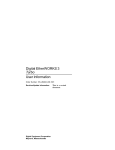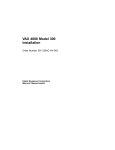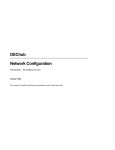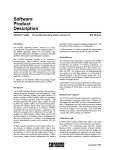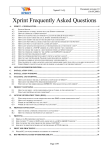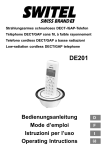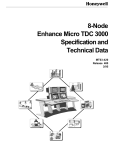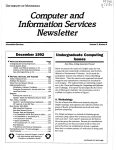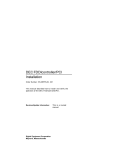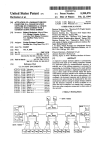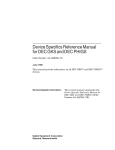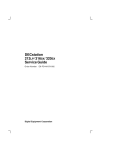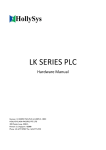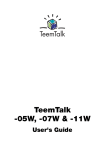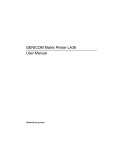Download Digital Equipment Corporation DEClaser 3250 Owner`s manual
Transcript
Software Product Description ___________________________________________________________________ PRODUCT NAME: PATHWORKS for DOS, Version 4.1B SPD 55.07.13 DESCRIPTION PATHWORKS for DOS is based on the Personal Computing Systems Architecture (PCSA), which is an extension of Digital Equipment Corporation's systems and networking architecture that merges the OpenVMS, ULTRIX, SCO[TM] UNIX(R), DOS, OS/2(R), and Macintosh(R) environments. PCSA provides a framework for integrating personal computers into an organization's total information system so different types of users can share information, large system resources, and network services across the entire organization. PCSA is implemented by the PATHWORKS product set. The PATHWORKS family of software products includes: o PATHWORKS for DOS - Software that allows a personal computer running the DOS operating system to use the facilities provided by PATHWORKS for VMS, PATHWORKS for ULTRIX, PATHWORKS for SCO UNIX, or PATHWORKS for OS/2 server software. The PATHWORKS for DOS features described in this Software Product Description (SPD) are supported using DECnet as the network transport with the following physical media types (Ethernet or Token Ring) and Digital servers, unless otherwise noted: - PATHWORKS for VMS Version 4.1, 4.1-1, 4.1-2 on VAX systems (Ethernet or Token Ring); PATHWORKS for VMS Version 4.2, 4.2-1 on VAX systems (Ethernet or Token Ring), on Alpha AXP systems (Ethernet only) - PATHWORKS for ULTRIX, Version 1.0, 1.1, 1.2 (Ethernet only) - PATHWORKS for OS/2 Server, Version 1.1 (Ethernet only), Version 2.0, 2.0B (Ethernet or Token Ring) DIGITAL March 1993 AE-KJ58P-TH - PATHWORKS for SCO UNIX, Version 1.0 (Ethernet only) PATHWORKS for DOS also supports NetBEUI as a network transport for file and print services only (as described in this SPD) to a PATHWORKS for OS/2 or SCO UNIX server. (NetBEUI is an optional transport and is not included in this software product. It can be obtained in the optional LAN Manager V2.1 for PATHWORKS for DOS product. Refer to the OPTIONAL SOFTWARE section of the System Support Addendum (SSA 55.07.13-x) for ordering information.) o PATHWORKS for DOS (TCP/IP) - Software that allows a personal computer running the DOS operating system to use the facilities provided by PATHWORKS for VMS, PATHWORKS for SCO UNIX, and PATHWORKS for ULTRIX using Ethernet as the physical media type, and PATHWORKS for OS/2 server using either Ethernet or Token Ring as the physical media type and TCP/IP as the network transport. This product contains the TCP/IP networking software and various TCP/IP network management utilities. PATHWORKS for DOS is a prerequisite product. (Refer to SPD 33.45.xx.) o PATHWORKS for DOS (NetWare(R) Coexistence) - Software that allows a personal computer running the DOS operating system to use the facilities provided by PATHWORKS for DOS, while concurrently using the facilities provided by NetWare client software, when both are utilizing a single Ethernet controller. (Refer to SPD 34.76.xx.) o PATHWORKS for VMS - Software that allows an OpenVMS-based VAX system or an OpenVMS-based Alpha AXP system to act as a file, print, and mail server to DOS- or OS/2-based personal computers. PATHWORKS for VMS on VAX systems supports Ethernet (with DECnet and TCP/IP as network transports) and Token Ring (with DECnet as the network transport) as physical media types. PATHWORKS for VMS on Alpha AXP systems supports Ethernet as the physical media type and DECnet as the network transport. (Refer to SPD 30.50.xx.) o PATHWORKS for ULTRIX - Software that allows an ULTRIX-based VAX or RISC system to act as a file, print, and mail server to DOS- or OS/2based personal computers. PATHWORKS for ULTRIX supports Ethernet as the physical media type and DECnet and TCP/IP as network transports. (Refer to SPD 32.44.xx.) 2 o PATHWORKS for SCO UNIX - Software that allows a SCO UNIX-based Intel[TM] 386/486 system to act as a file and print server to DOS and OS/2 personal computers. PATHWORKS for SCO UNIX is based upon Microsoft(R) LAN Manager for UNIX (LMU) V2.2. PATHWORKS for SCO UNIX supports Ethernet as the physical media type and DECnet, TCP/IP, and NetBEUI as network transports. (Refer to SPD 42.85.xx.) o PATHWORKS for Macintosh (VMS) - Software that allows an OpenVMSbased VAX system to act as a file, print, mail, and database server to Macintosh computers using Ethernet as the physical media type and DECnet as the network transport. (Refer to SPD 35.09.xx.) o PATHWORKS for Macintosh - Macintosh software that allows Macintosh clients to access file, print, mail, and database services on OpenVMS/VAX systems or file and print services on RISC/ULTRIX systems. (Refer to SPD 31.53.xx.) o PATHWORKS for OS/2 - Software that allows a personal computer running the OS/2 operating system to use the facilities provided by PATHWORKS for VMS, PATHWORKS for SCO UNIX, PATHWORKS for ULTRIX, and/or make the file and print facilities of an OS/2 system available to other personal computers using Ethernet or Token Ring as physical media types and DECnet, TCP/IP, and NetBEUI as network transports. (Refer to SPD 55.24.xx.) o PATHWORKS for OS/2 (TCP/IP) - Software that allows a personal computer running the OS/2 operating system to operate in a TCP/IP environment. OS/2 clients can be connected to a PATHWORKS for VMS, ULTRIX, SCO UNIX, or OS/2 server using Ethernet and TCP/IP; OS/2 clients can be connected to an OS/2 server using Token Ring and TCP /IP. This product contains the TCP/IP networking software and various TCP/IP network management utilities. PATHWORKS for OS/2 is a prerequisite product. (Refer to SPD 36.58.xx.) o PATHWORKS X.25 (DOS) - Software that allows one remote personal computer running the DOS operating system to connect with the packet switched data network (X.25 network) to any PATHWORKS server and to use the facilities provided by PATHWORKS for DOS using DECnet as the network transport. PATHWORKS for DOS is a prerequisite product. (Refer to SPD 42.73.xx.) 3 o PATHWORKS ISDN (DOS) - Software that allows one remote personal computer running the DOS operating system to connect with the Integrated Services Digital Network (ISDN) to any PATHWORKS server and to use the facilities provided by PATHWORKS for DOS using DECnet or TCP/IP as the network transport. PATHWORKS for DOS and PATHWORKS for DOS (TCP/IP) are prerequisite products. (Refer to SPD 45.68.xx.) The PATHWORKS for DOS software allows Digital, selected IBM(R), and selected IBM-compatible personal computers to participate in a DECnet Phase IV network as nonrouting (end) nodes. The PCs can utilize selected facilities and services of other Phase IV systems, and access information and services contained on other types of Digital systems in the DECnet network. Refer to the Supported Base Systems table in the System Support Addendum (SSA 55.07.13-x) for detailed configuration information. Features The PATHWORKS for DOS software provides: o Communications o Token Ring Source Routing and Arbitrary Media Access Control (MAC) Addressing Support o Token Ring Coexistence with IBM PC LAN Support Program Support o File Services o Permit Services o Disk Services o Print Services o Print Screen Support o Mail Services o Date and Time Services o InfoServer Network Storage Services 4 o Broadcast and Receive o LAN Manager, Version 2.0 Support o NETBIOS Interface Support o Task-to-Task Communications o Memory Savings Techniques o DOS Version 5.0 Task Switcher API Support o Installation and Configuration Utilities o PC DECwindows Motif(R) o Microsoft Windows[TM] Version 3.0/3.1 Support o Terminal Emulators o 3270 Terminal Emulator Support o SEDT Screen Editor o Enhanced DOS Utilities o Multilinguality o Digital Network Management o DECnet Network File Operations o Maintenance Operations Protocol (MOP) Support for Digital Terminal Servers and Routers o Remote Boot Capability o Network Device Interface Specification o EtherWORKS Support Communications PATHWORKS for DOS nodes can be connected to a network via an Ether-net, Token Ring, or asynchronous DECnet connection in a Local Area Net-work 5 (LAN) or Wide Area Network (WAN). Refer to the OPTIONAL HARDWARE section of the System Support Addendum (SSA 55.07.13-x) for detailson supported Ethernet, Token Ring, and asynchronous DECnet configurations. The PATHWORKS for DOS software can be installed directly on the PC's local hard disk and used for peer-to-peer DECnet network communications. In this configuration, server software is not required. The functions available to the PATHWORKS for DOS user depend largely upon the configuration of the rest of the network. Each DECnet product offers users its own level of capability and set of features. If asynchronous DECnet communication to another DECnet product is required, the Software Product Description (SPD) for the DECnet product in question must be consulted to determine if asynchronous operation is supported and to develop a supportable routing node configuration. Connections over asynchronous terminal lines, such as to a DECserver 200, are not supported. PATHWORKS for DOS software is a DECnet Phase IV network product and is warranted for use only with supported Phase IV products supplied by Digital. DECnet Phase IV networks can contain a maximum of 1,023 nodes per network area and up to 63 areas per network. Phase III nodes participating in Phase III/IV networks are limited to the Phase III routing capability of 255 nodes. Phase IV end nodes not directly connected to an Ethernet or Token Ring Local Area Network can connect to only one node (for PATHWORKS for DOS, that node must be Phase IV). In order to communicate with other nodes in the network, including Phase III nodes, that node must be a Phase IV full-function (routing) node. DECnet Phase IV Prime must be used in a Token Ring environment. PATHWORKS for DOS supports ONE of the following connections on any given personal computer: o Direct connections to baseband or twisted pair (10baseT) Ethernet local area networks via Ethernet controllers. Digital recommends the use of the multi-buffered DEC EtherWORKS controllers in networks that carry heavy traffic. 6 o Direct connections to shielded or unshielded twisted pair Token Ring local area networks via Token Ring controllers. o Asynchronous connections to the network via serial lines, using the personal computer's asynchronous communications adapter as the physical link. PATHWORKS for DOS supports the Digital Data Communications Message Protocol, Version 4.1 (DDCMP) for full-duplex transmission in point-topoint operation. An asynchronous connection to the network is accomplished over a serial line, using the personal computer's asynchronous communications adapter as the physical link. The adjacent system must be a DECnet Phase IV, full-function (routing) node, supporting asynchronous DDCMP (for example, DECrouter 200, DECnet-VAX). DDCMP provides error detection/correction and physical link management facilities. Neither half-duplex mode nor multi-point tributary operation is supported. PATHWORKS for DOS software utilizes Ethernet or Token Ring as its physical media type through the use of an Ethernet or Token Ring controller in conjunction with Digital's baseband Ethernet components or selected Token Ring components. PATHWORKS for DOS supports internetworking between local and/or remote Token Ring and/or Ethernet local area networks via a supported internetworking device. Token Ring Source Routing and Arbitrary MAC Addressing Support In a Token Ring environment, PATHWORKS for DOS provides for DECnet source routing support. PATHWORKS for DOS, Version 4.1B clients can communicate with PATHWORKS for VMS and/or OS/2 servers spanning multiple rings connected by source routing bridges. PATHWORKS for DOS V4.1B also allows use of applications that utilize arbitrary MAC addressing in a Token Ring environment. Applications that modify the network node address are supported; that is, those applications that adhere to IBM addressing policies, such as in some 3270 support environments, are supported in a PATHWORKS, DECnet, Token Ring environment. 7 In order to utilize the source routing and/or arbitrary MAC addressing features, the user must also update to the following products SIMULTANEOUSLY, if they exist in the network: o PATHWORKS for VMS V4.1-1, at minimum o DEC Token Ring Network Device Driver for OpenVMS V1.1 for the DEC TRNcontroller 100 o OpenVMS VAX operating system V5.5, at minimum o DECnet Phase IV Prime o The Proteon[TM] bridging routers (CNX 500 and 4100+) software release 12.1, at minimum o PATHWORKS for OS/2 Version 2.0B Token Ring Coexistence with IBM PC LAN Support Program Support PATHWORKS for DOS clients can coexist with the IBM PC LAN Support Program, Version 1.2 and various Token Ring-based applications that rely on the DLC interface. (The DLC is a driver utilized by the IBM PC LAN Support Program.) For example, a PATHWORKS for DOS client can simultaneously: o Use DECnet to access services and/or run applications from a PATHWORKS for VMS or OS/2 server o Use IBM's NetBEUI to access services and/or run applications from the IBM PC LAN Support Program server File Services Through the integration of Microsoft's LAN Manager, Version 2.0 with DECnet as well as emulation of IBM's NETBIOS, the DOS client is provided with a remote DOS file system that appears as a transparent extension of the client's local facilities. Optionally, file and print services can also be configured by combining Digital's Local Area Systems Transport (LAST) protocol with the DECnet protocol. Performance improvements can be realized in some applications that transfer small packets (such as database applications) 8 by using this configuration for file and print services. The user is limited to local area network access while using this combination of transports. File and print services over the DECnet transport are configured by default. File and print services over the LAST transport can be configured through the advanced menu of NETSETUP. Note: File and print services using the LAST transport are not available in Token Ring configurations or with Ethernet configurations using the PATHWORKS for ULTRIX, SCO UNIX, VMS (on Alpha AXP systems), or OS/2 servers. This feature will be discontinued concurrent with the next release of this product. Local area transports, such as NetBEUI, will be used for high-speed local area network communications. Permit Services PATHWORKS for DOS software provides DOS client systems with the ability to offer other users access to local resources via the PERMIT command. A client may offer other client systems access to its local disk; only a single connection is possible at any given time. Disk Services Through the use of Digital's Local Area Systems Transport (LAST) protocol and Local Area Disks (LAD), PATHWORKS clients are provided with high-performance virtual disks in a local area network. Virtual disks can be useful for remote boot, providing extra storage capacity for the personal computer user, or for backing up local files using the DOS COPY utility. Up to eight virtual disks can be opened simultaneously. Note: Disk services via LAD and LAST are not available in Token Ring configurations or with Ethernet configurations using either the PATHWORKS for ULTRIX, SCO UNIX, VMS (on Alpha AXP systems), or OS/2 servers. In a wide area network configuration or in a network without a PATHWORKS server, access to virtual disks through DECnet is provided via 9 the Network Device Utility (NDU) and the NDDRV device driver. NDU creates a file on the remote system, using the standard DECnet file access interface, representing a local device. Up to four network disks can be opened simultaneously. Note: NDU will be discontinued concurrent with the next release of this product. Sizes for both LAD and NDU disks can be 360KB, 720KB, 1.2M, 1.44M, 10M, 20M, 32M, 64M, 128M, 256M, 512M bytes in any combination. 10 Print Services Through the integration of Microsoft's LAN Manager, Version 2.0 with DECnet as well as emulation of IBM's NETBIOS, remote printers appear as a transparent extension of the client's facilities. This allows the redirection of local printing to a server-based printer. PATHWORKS for DOS software also allows one or more parallel printers connected to a PC to be offered to the network as remote printers through the use of the Local Area Terminal (LAT) protocol, Version 5.1. (The PC must be configured within the limitations of the specific version of DOS to utilize this feature.) This feature allows printing to occur in the background and does not prevent the user from running applications. PostScript(R) printers configured to use the parallel port are not supported. Note: Use of locally attached printers as remote networked printers is not available in Token Ring configurations or with Ethernet configurations using PATHWORKS for OS/2 or SCO UNIX servers. The Network Device Utility (NDU) (in conjunction with the NPDRV device driver) also permits assignment of a local printer device identifier to the default system printer of a remote DECnet system. The user can direct output to the network printer device identifier, NPRN:, causing the data to be sent to a file located at the remote node. This is a limited facility and does not allow the use of print job switches or the setting of printer characteristics. Note: NDU will be discontinued concurrent with the next release of this product. Refer to the System Support Addendum (SSA 55.07.13-x) for a list of supported printers. Refer to PATHWORKS for VMS (SPD 30.50.xx), PATHWORKS for ULTRIX (SPD 32.44.xx), PATHWORKS for SCO UNIX (SPD 42.85.xx), or PATHWORKS for OS/2 server software (SPD 55.24.xx) for more information on remote printer support. Print Screen Support 11 Users can print the contents of a screen to a local or remote printer over the network by using Print Screen functionality while using a DOSbased application (including the SETHOST terminal emulator). To print the contents of a screen while using the VT320 terminal emulator under Microsoft Windows, press the F2 key instead. (Print Screen support is not available while using PC DECwindows Motif.) 12 Mail Services PATHWORKS for DOS MAIL allows DOS clients to send and receive messages and documents to users of MAIL software (for example, MAIL-11) on systems that operate within the same DECnet network. (The PATHWORKS for VMS, ULTRIX, or OS/2 mail server must already be installed to utilize MAIL.) Note: MAIL is not supported with the PATHWORKS for SCO UNIX server. MAIL is a PC-style utility for sending and reading mail. It contains horizontal menu bars, pull-down menus, and Help listed by topics. MAIL allows the user to read mail without having to log into the server. The PATHWORKS for DOS MAIL utility enables the DOS client to: o Read, delete, forward, file, print, annotate, and reply to messages. o Send messages to a distribution list as well as to a remote nodename::username address. Messages can be sent to primary addressees and to carbon copy addressees. (To use the carbon copy feature, the user must manually add 'CC:' in the mail header.) o Create messages with the built-in editor (or a selected callable editor, such as SEDT), which can output an ASCII file. o Organize messages into folders that can be stored remotely on a server or locally on the system's hard disk. o Receive notification of new messages upon login and during PATHWORKS sessions. o Receive notification of incoming messages using the Receive utility. In most cases, notification is achieved via sound while using a graphics application, and via a pop-up message on the user's display while using character cell applications. This feature may be optionally disabled. o Send a binary file attachment (one binary file per message). o Configure the user interface as either command line or menu-driven. Date and Time Services 13 Clients can receive the date and time from the server. This service assures users of consistent timestamps on any given file created, shared, or updated by other users. InfoServer Network Storage Services Through the integration of Microsoft's CD-ROM extensions to the MS-DOS(R) operating system (MSCDEX), DOS clients can access the CD-ROM drives of Digital's InfoServer 100 or 150 containing applications written using the PC industry-standard formats, ISO 9660 and High Sierra. The InfoServer 100 and 150 are Ethernet-based, high-performance virtual disk servers capable of making CD-ROMs available to clients on the network. Refer to the InfoServer Software Product Description (SPD 33.20.xx) for further information on the InfoServer. Access to the InfoServer 100 and 150's CD-ROM drives is transparent to the DOS clients. Clients see the information they require on fully shareable drives as if they were locally attached devices. PATHWORKS for DOS clients can access up to eight Local Area Disk (LAD) drives, of which seven can be configured as CD-ROMs at any one time. Note: DOS clients cannot access the InfoServer 100s and 150s in a Token Ring configuration as they are Ethernet-only devices. Broadcast and Receive The Broadcast feature allows users to send (broadcast) messages to DOS and/or OS/2 clients. The Receive feature allows DOS clients to receive the messages. This feature allows DOS clients to notify other DOS clients of various network events. Broadcast and Receive functionality is only supported between PCs utilizing the same network transport. For example, users can send a message from a PC using DECnet to another PC using DECnet as the network transport; users cannot send a message from a PC using DECnet to a PC using TCP/IP as the network transport. LAN Manager, Version 2.0 Support 14 PATHWORKS for DOS includes Microsoft's LAN Manager, Version 2.0, which provides the following capabilities: o Application Programming Interface (API) functions (such as named pipes) that allow for the development and support of distributed applications. Note: Support of distributed applications requires full API support on both the client and server systems. Therefore, a LAN Manager serverclient application is currently supported only between a PATHWORKS for DOS or OS/2 client and a PATHWORKS for OS/2 or PATHWORKS for SCO UNIX server. o Net commands. o Basic Redirector - Use the Basic Redirector to access the file and print services of a PATHWORKS for VMS, ULTRIX, SCO UNIX, and/or OS/2 server(s). The Basic Redirector supports user names (share names) up to 32 characters. o Enhanced Redirector - Use the Enhanced Redirector to access the LAN Manager, Version 2.0 capabilities with a PATHWORKS for OS/2 server or PATHWORKS for SCO UNIX server. Note: The Enhanced Redirector supports user names (share names) up to 8 characters. Note: Microsoft's LAN Manager, V2.1, is available as an optional software package, including the NetBEUI transport. Refer to the OPTIONAL SOFTWARE section of the System Support Addendum (SSA 55.07.13-x) for details. NETBIOS Interface Support PATHWORKS for DOS supports the session level NETBIOS interface through interrupts 5C HEX and 2A HEX. Applications written to the NETBIOS interface as documented in the April 1987 edition of IBM NETBIOS Application Development Guide (order number S68X-2270-00) can be layered on PATHWORKS for DOS. 15 NETBIOS support allows computers running PATHWORKS for DOS and NETBIOS applications to communicate with other computers running PATHWORKS for DOS and NETBIOS applications. This feature preserves users' investment in industry standard applications. PATHWORKS for DOS NETBIOS applications can also communicate with other DECnet applications such as DECnet-VAX applications. The NETBIOS naming service and datagram service is supported in both Ethernet and Token Ring Local Area Network configurations. Note: Datagram services cannot be forwarded through routers. 16 Task-to-Task Communications User programs written in Microsoft's MACRO Assembler or the C language can exchange messages with other network user programs. A simple set of functions is provided by the transparent Task-to-Task interface (TTT), which allows communication and exchange of data with a remote network program through a limited set of DOS calls (for example, OPEN, CLOSE, READ, and WRITE). Transparent File Access (TFA) is a utility that allows access to remote DECnet systems through supported DOS function calls such as READ, WRITE, OPEN, CLOSE, SUBMIT, DIRECTORY, and DELETE. Note: The Task-to-Task interface (TTT) and the Transparent File Access (TFA) utility are currently not supported under Microsoft Windows, Version 3.0/3.1. TTT will be discontinued concurrent with the next release of this product. Digital recommends that applications utilize the socket library for this purpose. User program-to-user program capabilities (nontransparent) are possible in C or MACRO Assembly through a library of special network subroutine calls. This gives the network programmer access to the complete set of DECnet functions. The user may need to adapt the PATHWORKS for DOS C language subroutines to the specific C compiler being used. Small, medium, and large size memory models are supported. The PATHWORKS for DOS license grants a royalty-free, non-exclusive license to use Digital's source code located only in the subdirectory \PCSAV41\DECNET\SOURCE to create binaries that a user may then copy and merge with user's software for distribution to its customers. A program written for the DOS client using the programming libraries can be identified as a network object and invoked through the Job Spawner utility. The Job Spawner is a utility that allows a personal computer to act as a server for performing multiple service functions. When the Job Spawner is enabled (it must be the only utility running), it listens for connect requests from other nodes and initiates the program that 17 will service the request. The Job Spawner can initiate the File Access Listener (FAL), Data Test Receiver (DTR), and other user-written programs or batch files. Memory Savings Techniques PATHWORKS for DOS software supports several techniques for saving conventional PC memory. By using these techniques, additional conventional PC memory becomes available for user applications. o Several network components can be optionally loaded into expanded memory simultaneously. For 80386 and 80486 Intel processors, the PC must be configured with a user-supplied Expanded Memory Specification (EMS), Version 4.0 software driver. For 8088, 8086, and 80286 Intel processors, the PC must be configured with both a usersupplied EMS, Version 4.0 software driver and hardware. o The LAN Manager Basic Redirector can be loaded into the High Memory Area (HMA) portion of extended memory. The Enhanced Redirector can be loaded into HMA or into Expanded Memory (EMS). Users should use the Enhanced Redirector to take advantage of the LAN Manager capabilities in conjunction with a PATHWORKS for OS/2 server. The configuration must have a minimum of 64KB of extended memory (if either redirector is loaded in extended memory) and either the Digital-supplied driver, HIMEM.SYS, or a vendor-supplied high memory manager that supports Extended Memory Specification (XMS), Version 2.06. Note: DOS Version 5.0 or Version 6.0 cannot be loaded in the High Memory Area (HMA) if either the Basic or Enhanced Redirector is already loaded into the HMA. o Provides the ability to unload several network components from either conventional or EMS memory. The exact amount of conventional memory available for user applications will vary depending on: o Availability and size of EMS drivers 18 o Whether the LAN Manager Basic or Enhanced Redirector is used and what portion of memory they are loaded into o Whether an Ethernet or Token Ring controller is used o Network controller driver size o DOS version o Whether the PC is configured to remote boot o Parameters and drivers specified in CONFIG.SYS and PROTOCOL.INI o Other Terminate and Stay Residents (TSRs) that may be loaded The performance of EMS boards will vary depending on the EMS hardware and software selected. PATHWORKS for DOS software includes a utility, EMSSPEED, to measure the performance of EMS boards in a PATHWORKS environment. PATHWORKS for DOS software supports the use of Expanded Memory Specification (EMS) applications that are Version 4.0 compliant. Every effort has been made to ensure the software adheres to the EMS, Version 4.0 specification. However, individual applications may have interpreted the specification differently and, therefore, may not function in Digital's PATHWORKS for DOS network environment. Background EMS applications are usually device drivers and terminate and stay resident programs (TSRs). When PATHWORKS for DOS software is loaded into EMS with other background EMS applications, unpredictable results may occur. Some EMS drivers and disk caching programs provided by PC vendors may conflict with HIMEM.SYS, which provides XMS support. DOS Version 5.0 Task Switcher API Support PATHWORKS for DOS supports only those applications that support the DOS Version 5.0 Task Switcher Application Programming Interface (API). Every effort has been made to ensure that the PATHWORKS for DOS software adheres to the DOS Version 5.0 Task Switcher API. However, individual vendors' interpretation of the specification may vary and, 19 therefore, some applications may not function in Digital's PATHWORKS for DOS network environment with the Task Switcher enabled. Installation and Configuration Utilities PATHWORKS for DOS includes an automated installation procedure to install the client software to the PATHWORKS for VMS (on VAX systems) or ULTRIX server system or to the client's hard disk. A DOSLOAD utility is provided to simplify management of various versions of the DOS operating system to the PATHWORKS for VMS or ULTRIX server system. PATHWORKS for DOS includes a configuration utility, NETSETUP, which guides the user through the configuration process using a series of screen selections and online Help. The user's input to the procedure establishes the PATHWORKS for DOS node's network configuration and copies the startup software to the key disk. NETSETUP has three operational modes depending upon the configuration choices desired. In many cases, defaults can be selected for fast and easy configuration. PC DECwindows Motif PC DECwindows Motif is an MS-DOS application. It implements an X server that uses the industry-standard Release 4 of the X Window System, Version 11 (X11), protocol. An X Window System application, such as a DECwindows application, executing on a remote OpenVMS or ULTRIX system with DECnet may be displayed on and receive keyboard and mouse input from the personal computer. Only one transport, either DECnet or TCP/IP, is supported at any one time regardless of the number of applications running in various windows. PC DECwindows Motif is supported only on Intel 80286, 80386, and 80486 machines listed in the System Support Addendum (SSA 55.07.13-x). Use: o DWDOS286 for Intel systems with 80286, 80386, and 80486 processors 20 o DWDOS386 for Intel systems with 80386 and 80486 processors PC DECwindows Motif requires additional extended memory over and above the conventional, EMS, and XMS memory required by the other components of the PATHWORKS for DOS product. A minimum of 1 MB of system memory must be free and accessible to start PC DECwindows Motif after configuring the system with the required PATHWORKS network components. This memory may be made up of free conventional and extended memory. Between 1 MB and 4 MB of system memory must be free and accessible to run X Window System applications. The specific amount of X Server memory required will depend on the memory requirements of the application(s) chosen by the user. Depending on the number of X Window System applications being displayed and the memory requirements of each application, the user should test these types of configurations with PC DECwindows Motif prior to production use. Two utilities that report the amount of memory available to the X Server are provided: o DWINFO2 is for Intel systems with 80286, 80386, and 80486 processors and reports the amount of memory available to DWDOS286. o DWINFO3 is for Intel systems with 80386 and 80486 processors and reports the amount of memory available to DWDOS386. Because PC DECwindows Motif includes its own extended memory manager, it will conflict with expanded memory managers that do not support the Virtual Control Program Interface (VCPI), eXtended Memory Standard (XMS), or the DOS Protected Mode Interface (DPMI) specification. PC DECwindows Motif may also conflict with other drivers using extended memory, such as disk caching programs and RAM drives, if their presence cannot be detected by the PC DECwindows Motif extended memory manager. DWDOS386 does not support DPMI. 21 DECwindows and X Window System applications that do not take into account the PC's hardware characteristics (such as screen resolution, screen aspect ratios, keyboard layouts, and number of mouse buttons) may not function optimally with a PC as a display server. In addition to the supported OpenVMS and ULTRIX DECwindows window managers, Digital provides an OpenVMS window manager designed specifically for PC screens that allows users to move windows off the screen. Note: The OpenVMS window manager will be discontinued concurrent with the next release of this product. A configuration utility, DWCONFIG, is provided for users to configure the X Server for their hardware and configure the user preferences parameters. A KEYSYM compiler, DWKEYSYM, is provided for users to build custom keyboard layouts to support applications. A font compiler, DWFONT, is provided to compile fonts in the Adobe(R) Bitmap Distribution Format, Version 2.1 into a format for the X Server. A DECnet Remote Application Startup Program is provided for OpenVMS systems (as a DCL command procedural file) and for ULTRIX VAX and RISC systems (as an executable program). These programs start X Window System applications on the host system on behalf of the X Server. Print Screen support is not available while using PC DECwindows Motif. Use of PC DECwindows Motif exclusively does not require that a PATHWORKS server reside in the network. Microsoft Windows Version 3.0/3.1 Windows Support PATHWORKS for DOS software supports Microsoft Windows, Version 3.0/3.1, including: o Access to file and disk services provided through the Microsoft Windows, Version 3.0/3.1 File Manager. 22 o Access to print services provided through the Microsoft Windows, Version 3.0/3.1 Control Panel. o The ability to run the networking software in expanded memory (EMS) with Windows, Version 3.0 in Real, Standard, or 386 Enhanced modes; or in Standard or 386 Enhanced modes with Windows V3.1. If using the remote boot feature in conjunction with Microsoft Windows, Version 3.0/3.1 in 386 Enhanced Mode, the Microsoft-supplied TSR named RPLMEM must be loaded. If using Microsoft Windows, Version 3.0/3.1 in 386 Enhanced Mode, the Basic Redirector must be loaded into conventional memory. EMM386.SYS is the memory manager shipped with Microsoft Windows, Version 3.0/3.1. PATHWORKS for DOS does not support the use of other thirdparty memory managers while using Microsoft Windows, Version 3.0/3.1. o A PATHWORKS VT320 terminal emulator for Microsoft Windows is provided. (Refer to the Terminal Emulators section for more detail.) o Windowed versions of the Network File Transfer (NFT) and File Access Listener (FAL) network utilities are provided. o A DOS-based menu-driven utility (WIN3SETU) is provided to install PATHWORKS-specific components needed to support the Digital LK250 keyboard and DEPCA mouse while using Microsoft Windows, Version 3.0 /3.1. o A DECnet Socket Library that contains support for Microsoft Windows, Version 3.0/3.1 and DOS-based applications is included. The library is provided for programmers who wish to write networked applications that execute under Microsoft Windows, Version 3.0/3.1. o Programming access for Microsoft Windows, Version 3.0/3.1 and DOSbased applications is provided to Digital's enhanced NETBIOS functions. o A Terminal Access Library (TRMNLAXS) that provides LAT, CTERM, and TELNET access to Microsoft Windows, Version 3.0/3.1 applications is included. The library is provided for programmers who wish to write terminal emulators that execute under Microsoft Windows, Version 3.0/3.1. 23 o PIFs (Program Information Files) for most DOS-based PATHWORKS for DOS applications/utilities are provided. (These PIFs are provided as examples and should work with most configurations. The user may need to tailor the PIFs, given the application mix and specific personal computer configuration.) Note: The Task-to-Task interface (TTT) and the Transparent File Access (TFA) utility are currently not supported under Microsoft Windows. TTT will be discontinued concurrent with the next release of this product. Digital recommends that applications utilize the socket library for this purpose. Only one transport, either DECnet or TCP/IP, is supported at any one time (regardless of the number of windows open in a Microsoft Windows environment). Terminal Emulators The PATHWORKS for DOS software includes two terminal emulators. This software allows users to establish terminal sessions with a remote host computer. These emulators include: o VT320 - a VT320-like terminal emulator that runs under Microsoft Windows o SETHOST - a DOS VT320-like character-cell terminal emulator Note: Both terminal emulators are not fully VT320 compatible. For example, SETHOST does not support double-height, double-width characters or replaceable character sets (DRCS); the VT320 does not support full modem control or replaceable character sets (DRCS). Terminal sessions can be established using either a serial communications port or through an Ethernet or Token Ring network controller on the client. VT320 Features for Microsoft Windows, Version 3.0/3.1 o User-definable color attributes, background/foreground, reverse, bold, underline. 24 o While using Microsoft Windows, Version 3.0/3.1, support for Digital's Local Area Terminal (LAT) and CTERM protocols and serial terminal communication. The user can load LAT into EMS, thereby gaining more memory for other applications. Note: If using Token Ring, only the CTERM protocol and serial terminal communications are supported. Terminal emulation connections to the PATHWORKS for SCO UNIX server are only available using the CTERM protocol. o Support for the Microsoft Windows Clipboard to cut and paste information. o Ability to log characters received from the host into a file. o Ability to send characters to the host from a file instead of from the keyboard. o Setup feature allows selection and saving of terminal characteristics. o Printing to a Digital remote or local printer; printing may be a screen at a time or a toggle-like function may be used to print everything from the screen until the toggle is switched off. o Digital multinational and ISO multilingual character sets and compose sequences as defined below: - ISO (default) - International Standards Organization character set - IBM extended and IBM Norway/Denmark extended character sets - MCS - DEC Multinational Character set - NRC - Supports a 7-bit National Character Replacement set for the following countries: United States Germany 25 Switzerland /French Sweden Italy Denmark United Kingdom Switzerland/German Norway Spain France Finland Canada o Support for scripting facilities. The script processing language enables the automation of frequently executed functions. Note: The VT320 terminal emulator fonts accommodate video resolutions of 800 x 600 or less. SETHOST Features o Support for Digital's Local Area Terminal (LAT) and CTERM protocols and serial terminal communication. Note: If using Token Ring, only the CTERM protocol is supported. Terminal emulation connections to the PATHWORKS for SCO UNIX server are only available using the CTERM protocol. o Support for a maximum of four simultaneous SETHOST sessions via LAT or CTERM. Only one session can be enabled when SETHOST uses the asynchronous communication port for an asynchronous terminal connection. o Setup feature allows selection and saving of terminal characteristics. o Ability to log characters received from the host into a file. o Ability to send characters to the host from a file instead of from the keyboard. 26 o Support for the following list of character sets: ISO Latin-1 (ISO), DEC Multinational (MCS), DEC Technical (TCS), and the following 7bit National Character Replacement Sets (NRCS): ASCII British French German Italian Finnish Spanish Swedish Norwegian/Danish Swiss Canadian Dutch Portuguese o Support for PC code page character sets. Translation table files between the Digital character sets and the PC code page character sets (437, 865, 850, 860, 863) are used by SETHOST, NFT, and MAIL to provide code page support. o Support for scripting facilities. The script processing language enables the automation of frequently executed functions. o Printing to a Digital remote or local printer; printing may be a screen at a time or a toggle-like function may be used to print everything from the screen until the toggle is switched off. SETHOST sessions can also be logged to a file for future examination. 3270 Terminal Emulation Support PATHWORKS for DOS includes a component called Systems Network Architecture Gateway NETBIOS Interface (SNAGNI). SNAGNI is an enabling technology that allows 3270 terminal emulators to communicate with an IBM mainframe via a Digital DECnet/SNA Gateway while operating in a PATHWORKS for DOS environment. Refer to the vendor's 3270 documentation to determine if the terminal emulator in question can interoperate with SNAGNI. Note: The SNAGNI component will be discontinued concurrent with the next release of this product. Digital has developed new IBM connectivity software, called Gateway Access Interface (GAI), for communication with 27 Digital's DECnet/SNA gateways. GAI is designed to be included with thirdparty terminal emulators, rather than shipped as a part of PATHWORKS, for those vendors who choose to include and support it. This change will allow users more choices in third-party terminal emulation vendors and will allow vendors to better support their products in a PATHWORKS environment. SEDT Screen Editor SEDT is a text editor that allows the display and editing of a full screen of text. It may be used as the callable editor for creation of text messages within the PATHWORKS for DOS MAIL utility. The features and capabilities of SEDT include: o Simultaneous editing of up to four files in separate buffers o Text selection, insertion, deletion, and search o Cut and paste capability o Use and definition of multiple rulers, with tab, margin, and justification settings o An information line that displays the current editing modes, such as forward versus reverse search, insert versus replace, and cut and paste modes o A file information line that displays the name of the file being edited, the current line and column position in the file, and the file buffer in use o Customization of commands and configuration o Definable keyboard maps Enhanced DOS Utilities These utilities include support for Digital's LK250 keyboard (including international versions) and Microsoft Mouse emulation, Version 7.0 of the Digital VSXXX-AA mouse (for use with a DEC EtherWORKS Ethernet controller that is equipped with a mouse port). 28 Note: The Digital-mode LK250 keyboard drivers and the VSXXX-AA mouse driver will be discontinued concurrent with the next release of this product. PATHWORKS will continue to support the LK250 in industry-standard mode and industry-standard mice. Multilinguality Some PATHWORKS for DOS components are available in languages other than English. More than one language variant can be run from the PC without rebooting. For more information, refer to the following SPDs: Swedish (SPD 55.17.xx) Spanish (SPD 55.18.xx) Dutch (SPD 55.19.xx) French (SPD 55.20.xx) German (SPD 55.21.xx) Italian (SPD 55.22.xx) Danish (SPD 42.74.xx) Finnish (SPD 42.76.xx) Portuguese (SPD 42.75.xx) Norwegian (SPD 42.77.xx) Czech (SPD 42.08.xx) Russian (SPD 45.49.xx) Slovak (SPD 47.45.xx) Polish (SPD 47.09.xx) Hungarian (SPD 47.06.xx) 29 Digital Network Management The Network Control Program, Network Management Listener, and Local Area Terminal Control Program are provided for network management purposes. The Network Control Program (NCP) performs three primary functions: o Displaying statistical and error information. The user can display the status of the local node's DECnet activity and statistics related to both the node and the communication line. o Controlling the node's network components. Control functions are limited to starting and stopping the line and activating the local node. o Testing local network components. Test messages can be sent and received over the line either between the personal computer and adjacent node or through controller or modem loopback arrangements. The Network Control Program (NCP) can act as a loopback mirror to which remote nodes can send test messages for diagnostic purposes. PATHWORKS for DOS provides for limited local network event logging. The Network Management Listener (NML) task is an optional background task that allows remote DECnet nodes to monitor network activity and parameters on DOS nodes. Remote alteration of network parameters is not supported. LATCP (Local Area Terminal Control Program) allows the user to: o Display statistical and error information for LAT o Manipulate preferred services (add, delete) o Set LAT parameters DECnet Network File Operations The Network File Transfer and File Access Listener utilities are provided for network file operations. 30 Using the Network File Transfer (NFT) utility, users can transfer sequential ASCII and binary files between the personal computer and another DECnet node. Files can be transferred in both directions between the locally supported DOS file system devices and the file systems of other DECnet nodes. NFT runs to the exclusion of other tasks or programs, except when running under Microsoft Windows, Version 3.0/3.1. On transfer of binary files to a DOS client, file data can be restored on such transfers from the personal computer to a record file system through use of utility switch settings. The File Access Listener (FAL) server task provides access to the personal computer's file resources from remote systems. FAL provides user ID and password protection. FAL runs to the exclusion of other tasks or programs, except when running under Microsoft Windows, Version 3.0 /3.1. 31 Maintenance Operations Protocol (MOP) Support for Digital Terminal Servers and Routers Maintenance Operations Protocol (MOP) down-line load and up-line dump support for Digital terminal servers and routers is included in PATHWORKS for DOS. This allows users to utilize Digital communications servers in environments that would not justify the presence of OpenVMS or ULTRIX load host systems. This capability is not supported if using Token Ring as Digital terminal servers and routers are Ethernet-only devices. Remote Boot Capability Users can remote boot a personal computer from an Ethernet network virtual boot disk using the disk services capability of the PATHWORKS for VMS (on VAX platforms only) software. The personal computer must contain a DEC EtherWORKS Ethernet controller. Personal computers using DEC EtherWORKS, 3Com(R) EtherLink(R) II, or 3Com EtherLink/MC Ethernet controllers can remote boot by utilizing the floppy remote boot procedure. Note: Remote boot is unavailable in Token Ring network configurations. Remote boot is unavailable in Ethernet network configurations with PATHWORKS for VMS (on Alpha AXP systems), PATHWORKS for ULTRIX, SCO UNIX, or OS/2 servers. The remote boot capability is also unavailable if the user chooses to use a Network Device Interface Specification (NDIS), Version 2.0.1 driver with any Ethernet controller. Remote boot is currently unavailable if using a DEPCA Rev D or DEC EtherWORKS 3 controller. Network Device Interface Specification PATHWORKS for DOS networking software is Network Device Interface Specification (NDIS), Version 2.0.1 compatible. NDIS is a standard developed by Microsoft Corporation and 3Com Corporation. Digital's implementation of the NDIS standard is intended to allow users a greater choice of Ethernet or Token Ring controllers. This implementation is not intended to support the simultaneous operation of the PATHWORKS for DOS product and other vendors' networking products. 32 Because the PATHWORKS for DOS software is written to the NDIS interface, users can use third-party Ethernet or Token Ring controllers if accompanied by an NDIS, Version 2.0.1 driver. Every effort has been made to ensure the software adheres to the NDIS, Version 2.0.1 specification. However, individual vendor's interpretation of the specification may vary and therefore the application may not function in Digital's PATHWORKS for DOS network environment. Digital-developed NDIS drivers, for Digital EtherWORKS, EtherWORKS 3, or Token Ring controllers, are fully supported. The PATHWORKS for DOS product contains several NDIS drivers for the convenience of our users. The NDIS drivers are furnished "AS IS," and Digital cannot be held liable for any special, indirect, incidental, or consequential damages. Remote boot is not supported using NDIS drivers in either Ethernet or Token Ring configurations. EtherWORKS Support PATHWORKS for DOS supports Digital's family of EtherWORKS controllers via Digital's native datalinks (DLLs) or NDIS drivers. (These drivers are included in this software package, with the exception of the EtherWORKS EISA TP/BNC. This driver is included with the controller itself.) The family of EtherWORKS controllers includes: EtherWORKS LC, EtherWORKS LC/TP, EtherWORKS MC, EtherWORKS MC TP/BNC, EtherWORKS Turbo, EtherWORKS Turbo/TP, EtherWORKS Turbo TP/BNC, and EtherWORKS EISA TP /BNC. PATHWORKS for DOS also supports Digital's family of EtherWORKS 3 controllers via NDIS drivers. These drivers are NOT included in this version of PATHWORKS for DOS; they are included with the controller itself. The family of EtherWORKS 3 controllers includes: EtherWORKS 3 TURBO, EtherWORKS 3 TURBO TP, EtherWORKS 3 TURBO PLUS. Note: Digital Ethernet NDIS drivers (for the EtherWORKS family) can also be used with previous versions of the Digital Ethernet controller family, DEPCAs. 33 Note: Digital recommends the use of the Digital multi-buffered EtherWORKS controllers in networks which carry heavy traffic. Restrictions and Limitations To create a floppy key disk, a disk greater than or equal to 720KB is required for booting purposes. Any application that does not properly mask and unmask interrupts is incompatible with this product. For example, applications that use IBM BASICA, Version 1.0 interpreter or compiler or GW BASIC(R), Version 1.0 do not unmask the interrupts when they exit. In these cases, a BASIC program must be interpreted or recompiled using a version of BASIC that would unmask the interrupts. For IBM Personal Computer AT(R)-compatible configurations with EGA or VGA graphics adapter, the DEPCA Revision E or later is required to utilize EMS. For asynchronous DECnet network connections, all client functionality and network services are supported, except: o NETBIOS naming service and datagrams. o Remote boot. o Local area disk services provided through the Local Area Systems Transport (LAST) protocol. (The user can access virtual disks via NDU in an asynchronous DECnet environment.) o LAT. o PC DECwindows Motif. o Microsoft Windows, Version 3.0/3.1 running in Standard or Enhanced Mode. Simultaneous Ethernet network activity and non-DECnet asynchronous communication via the asynchronous port results in character loss on the asynchronous port. 34 The "Autosense Mode" of the Zenith(R) Data Systems Enhanced EGA card (Z449) is incompatible with PATHWORKS for DOS and must be disabled. Refer to the Zenith Owner's Manual for more information. HARDWARE REQUIREMENTS Systems, components, and peripherals as specified in the System Support Addendum (SSA 55.07.13-x) are supported. PATHWORKS for DOS, Version 4.1B has been tested on several supported configurations (refer to SSA 55.07.13-x). If a customer problem with PATHWORKS for DOS software can be reproduced by the customer on one of these supported configurations, Digital will work the problem to resolution on these supported configurations. If the customer problem cannot be reproduced by the customer on one of these supported configurations, it will be the responsibility of the customer to resolve the issue. SOFTWARE REQUIREMENTS Server Software If the PATHWORKS for DOS software is used in a server/client environment, at least one of the following server products are required: o PATHWORKS for VMS (SPD 30.50.xx) o PATHWORKS for ULTRIX (SPD 32.44.xx) o PATHWORKS for OS/2 server software (SPD 55.24.xx) o PATHWORKS for SCO UNIX (SPD 42.85.xx) Refer to the System Support Addendum (SSA 55.07.13-x) for availability and required versions of prerequisite/optional software. 35 ORDERING INFORMATION Software Licenses: QL-0TL**-** Software Media and Documentation: QA-0TL**-** o QA-0TL*A-H5 (TK50 cartridge) or -HM (magtape) for use with a VAX/OpenVMS server. o QA-0TL*E-H5 (TK50 cartridge) or -HM (magtape) for use with a VAX/RISC ULTRIX server. o QA-0TL*A-H7 (high-density 5.25-inch floppies) or -HB (low-density 3.5-inch floppies), except for Czech, Russian, Slovak, Polish, and Hungarian, order QA-MTQ**H7 or -HB. Use these all-floppy kits: - With a PATHWORKS for OS/2 server - With a PATHWORKS for SCO UNIX server - With a PATHWORKS for VMS on an Alpha AXP server system - To use PATHWORKS for DOS locally (installed to a hard disk) - With DECnet-DOS only (recommended) - With PATHWORKS for DOS or DECnet-DOS in an asynchronous network environment (recommended) - To use any component of the PATHWORKS for DOS product which does not require a file server, such as PC DECwindows Motif o QA-0TL*B-H7 (high-density 5.25-inch floppies) or -HB (low-density 3.5-inch floppies) for additional languages, except for Czech, Russian, Slovak, Polish, and Hungarian, order QA-MTQ**-H7 or -HB Documentation Complete Documentation (for OpenVMS Servers): QA-0TL*B-GZ Complete Documentation (for ULTRIX Servers): QA-0TL*E-GZ Complete Documentation Set (for PC-based systems): QA-0TL*C-GZ User Documentation: QA-0TL*A-GZ 36 DECnet-DOS Documentation: QA-0TL*D-GZ PATHWORKS for DOS User's Handbook: AA-PAF7C-TK Note: These documentation kits/handbook are included in the software media and documentation kits listed previously. Order only if you require additional copies. Digital recommends that each PATHWORKS user has a copy of the PATHWORKS for DOS User's Handbook. DECnet Programmer's Documentation: AA-PAFJC-TK Note: This document is NOT included in the media and documentation kits listed previously. Order if you require this level of information. * Denotes variant fields. For additional information on available licenses, services, and media, refer to the appropriate price book. Note: The availability of these software product options and services may vary by country. Customers should contact their local Digital office for information on availability. SOFTWARE LICENSING Each PATHWORKS for DOS client license conveys two separate rights: 1. The license entitles the user to use all the software that is included in the PATHWORKS for DOS media kit on a single DOS personal computer and any of the add-on products listed below: - PATHWORKS for DOS (NetWare Coexistence) software (SPD 34.76.xx) on the DOS personal computer. The media and documentation for PATHWORKS for DOS (NetWare Coexistence) are available separately. - PATHWORKS X.25 (DOS) software (SPD 42.73.xx) on the DOS personal computer. The media and documentation are available separately. - PATHWORKS ISDN (DOS) software (SPD 45.68.xx) on the DOS personal computer. The media and documentation are available separately. - Any number of the PATHWORKS for DOS language variants (see Multilinguality section). 37 - DEC MAILworks for DOS software (SPD 31.51.xx) on the DOS personal computer. The media and documentation are available separately. The DEC MAILworks server for OpenVMS license and software must also be purchased separately. 2. The license entitles the user to connect to any of the PATHWORKS LAN Manager servers listed below for file and print services from a single DOS personal computer: - The PATHWORKS for VMS server software on one or more VAX and/or Alpha AXP systems. - The PATHWORKS for ULTRIX server software on one or more VAX and /or RISC systems. - The PATHWORKS for SCO UNIX server software on one or more Intel systems. A PATHWORKS for DOS client license must be obtained in advance for each DOS personal computer on which the PATHWORKS for DOS client software is installed and/or for each DOS personal computer that connects to a PATHWORKS server (listed above) for file and print services. To use the PATHWORKS for OS/2 server software, a separate server license is required. (Refer to SPD 55.24.xx.) The CD-ROM sharing capability of the PATHWORKS for DOS product is restricted for use with the Digital InfoServer products only. This software is furnished under the licensing provisions of Digital Equipment Corporation's Standard Terms and Conditions. For more information about Digital's licensing terms and policies, contact your local Digital office. SOFTWARE PRODUCT SERVICES A variety of service options are available from Digital. For more information, contact your local Digital office. 38 SOFTWARE WARRANTY Warranty for this software product is provided by Digital with the purchase of a license for the product as defined in the Software Warranty Addendum of this SPD. (R) 3Com and EtherLink are registered trademarks of 3Com Corporation. (R) Adobe and PostScript are registered trademarks of Adobe Systems, Inc. (R) COMPAQ, Deskpro, and LTE are registered trademarks of COMPAQ Computer Corporation. (R) CompuServe is a registered trademark of CompuServe, Inc. (R) GW BASIC, Microsoft, and MS-DOS are registered trademarks of Microsoft Corporation. (R) Hercules is a registered trademark of Hercules Computer Technology. (R) IBM, OS/2, Personal Computer AT, Personal System/2, and PS/2 are registered trademarks of International Business Machines Corporation. (R) Macintosh is a registered trademark of Apple Computer, Inc. (R) Motif is a registered trademark of Open Software Foundation, Inc. (R) NetWare is a registered trademark of Novell, Inc. (R) Olivetti is a registered trademark of Ing. C. Olivetti. (R) Tandy is a registered trademark of Tandy Corporation. (R) Toshiba is a registered trademark of Kabushiki Kaisha Toshiba. (R) UNIX is a registered trademark of UNIX System Laboratories, Inc. (R) Zenith is a registered trademark of Zenith Electronics Corporation. [TM] Everex is a trademark of Everex Systems, Inc. [TM] Intel is a trademark of Intel Corporation. 39 [TM] Proteon is a trademark of Proteon Associates, Inc. [TM] SCO is a trademark of Santa Cruz Operations, Inc. [TM] SLT/286 is a trademark or Compaq Computer Corporation. [TM] Windows is a trademark of Microsoft Corporation. [TM] The DIGITAL Logo, Alpha AXP, AXP, DDCMP, DEC, DEClaser, DECnet, DECnet-DOS, DECpc, DECrouter, DECserver, DECstation, DECwindows, DEPCA, Digital, EtherWORKS, LA, LA50, LA324, LAT, LN03, LN03 PLUS, LVP16, LAT, MAILworks, OpenVMS, PATHWORKS, PrintServer, RX, RX33, TK, ULTRIX, VAX, VMS, and VT320 are trademarks of Digital Equipment Corporation. 40 System Support Addendum _______________________________________________________________________________ _______________________________________________________________________________ PRODUCT NAME: PATHWORKS for DOS, Version 4.1B SSA 55.07.13-A HARDWARE REQUIREMENTS Systems, components, and peripherals specified below are supported except as noted for specific software components: o An Intel[TM] 8086-, 8088-, 80286-, 80386-, 80486-based personal computer from the Supported Base Systems table. o A minimum of 640KB system memory. o One network connection, either asynchronous or via an Ethernet or Token Ring controller. More than one communications device may be installed in a system subject to system limitations. If use of another device is required, the system may need to be rebooted. A device cannot typically be shared with other communications products. o In a PC local area network, at least one base system must have one diskette drive capable of reading 5.25-inch (360KB) diskettes or 3.5-inch (720KB) diskettes to load the distribution media. (To create a floppy key disk, a disk greater than or equal to 720KB is required for booting purposes.) o In an asynchronous network environment, every base system must have at least one diskette drive capable of reading 5.25-inch (360KB) diskettes or 3.5-inch (720KB) diskettes (to load the distribution media) and 12MB of free hard disk space. o A system power supply that provides at least 130 watts (for IBM(R) XTs with a DEPCA). o Standard keyboards that come with the base systems listed in the Supported Base Systems table are supported. DIGITAL March 1993 AE-NF29L-TH Block Space Requirements PATHWORKS for DOS software may be stored either on the personal computer's local storage device or on the server system. Maximum disk space required for the installation of all PATHWORKS for DOS software is 18MB of free disk space (or 35,000 blocks on an OpenVMS or ULTRIX server). Other configurations, using selected components, may require less disk space. OPTIONAL HARDWARE Expanded Memory Specification Version 4.0 Support PATHWORKS for DOS software supports the use of Expanded Memory Specification (EMS) applications that are EMS, Version 4.0 compliant. The PATHWORKS for DOS networking software that can be loaded into EMS requires 144KB of memory. Digital Printers PATHWORKS for DOS software supports the following Digital printers that can be connected to the PC: DECmultiJET 1000 DECmultiJET 2000 DEClaser 1100 DEClaser 1150 DEClaser 2100 DEClaser 2150 DEClaser 2200 DEClaser 2250 DEClaser 3200 DEClaser 3250 DEClaser 1152 DEClaser 2150plus DEClaser 2250plus LA75 LA310 LA75Plus 2 LA50 LA210 LJ250 LJ252 LN03 LN03 PLUS LA70 LA324 Turbo PrintServer 32 PrintServer 20 PrintServer 40 LA424 Digital Keyboards, Mice The following keyboards and mice from Digital may be added to the IBM PC, XT, AT, and DECstation PC family systems described in the Supported Base Systems table: o Digital LK250-xx Keyboard Note: The IBM PC Model 5150 system unit must have a system ROM BIOS dated 10-27-82 or later. o Keyboard cables required to connect the LK250 keyboard to: - IBM AT, DECstation 210, 316, 320 - BCC37-06 - IBM PC and XT - BCC41-06 - DECstation 200, 350 - BCC39-06 - DECstation 220, 300, 316, 320, 325, 425 - BCC40-06 o Digital VSXXX-AA 3-button mouse (for use with a DEC EtherWORKS Ethernet controller that is equipped with a mouse port) o Digital DECstation Mouse PC6XS-** (DECstation models 200, 220, 300, 316, 320, 325, 425 only) Note: The Digital-mode LK250 keyboard drivers and the VSXXX-AA mouse driver will be discontinued concurrent with the next release of this product. PATHWORKS will continue to support the LK250 in industrystandard mode and industry-standard mice. 3 Video Adapters PATHWORKS for DOS software supports the following video adapters (subject to vendor support of the adapters in base systems): o MDA - IBM Monochrome Display Adapter o CGA - IBM Color Graphics Adapter o EGA - IBM Enhanced Graphics Adapter o MCGA - IBM PS/2(R) Model 30 video hardware o VGA - IBM Video Graphics Adapter o Hercules(R) Monochrome - Hercules Graphic Card o COMPAQ(R) Video Graphics Controller Board o COMPAQ Enhanced Color Graphics Board o COMPAQ Video Display Controller Board o COMPAQ PLASMA Internal Display Controller o COMPAQ LCD Internal Display Controller o OGC - Olivetti(R) Graphics Controller o OVC - Olivetti VGA-Compatible Controller o OEC - Olivetti EGA-Compatible Controller o EVC - Olivetti Eisa Video Controller for VGA+ o PVGA - Paradise Video Graphics Array, mono and color o PGC - Positive Graphic Controller o Zenith(R) Data Systems Enhanced EGA Card o DECstation 8-bit Video Adapter o DECstation 16-bit SVGA Adapter 4 Ethernet and Token Ring Controllers PATHWORKS for DOS supports Digital's family of EtherWORKS controllers via Digital's native datalinks (DLLs) or NDIS drivers. (These drivers are included in this software package, with the exception of the EtherWORKS EISA TP/BNC. This driver is included with the controller itself.) The family of EtherWORKS controllers includes: EtherWORKS LC, EtherWORKS LC/TP, EtherWORKS MC, EtherWORKS MC TP/BNC, EtherWORKS Turbo, EtherWORKS Turbo/TP, EtherWORKS Turbo TP/BNC, and EtherWORKS EISA TP /BNC. PATHWORKS for DOS also supports Digital's family of EtherWORKS 3 controllers via NDIS drivers. These drivers are NOT included in this version of PATHWORKS for DOS; they are included with the controller itself. The family of EtherWORKS 3 controllers includes: EtherWORKS 3 TURBO, EtherWORKS 3 TURBO TP, EtherWORKS 3 TURBO PLUS. Note: Digital Ethernet NDIS drivers (for the EtherWORKS family) can also be used with previous versions of the Digital Ethernet controller family, DEPCAs. Note: PATHWORKS for DOS also supports IBM's family of Token Ring controllers via NDIS or DLC drivers. Because the PATHWORKS for DOS software is written to the NDIS interface, users can use third-party Ethernet or Token Ring controllers if accompanied by an NDIS, Version 2.0.1 driver. Every effort has been made to ensure that the software adheres to the NDIS, Version 2.0.1 specification. However, individual vendors' interpretation of the specification may vary and therefore the application may not function in Digital's PATHWORKS for DOS network environment. Refer to the PC Interoperability Guide for a list of those controller cards that are qualified with PATHWORKS. This guide can be found on CompuServe(R) (in the Digital DECPCI forum) or from your Digital representative. Digital-developed NDIS drivers for Digital EtherWORKS, EtherWORKS 3, or Token Ring controllers are fully supported. Asynchronous Communications Support 5 Asynchronous DDCMP network connections are supported utilizing the system's asynchronous serial port. Maximum line speed can be determined by consulting the PC vendor's documentation. Recoverable data errors may occur at the higher line speeds. All models listed in the Supported Base Systems table can be configured asynchronously unless otherwise noted. Microsoft(R) Windows[TM] Support Mice, Keyboards o A Digital VSXXX-AA Mouse driver (for use with a DEC EtherWORKS Ethernet controller that is equipped with a mouse port), which supports both Digital's native datalink and NDIS drivers, is provided. o A Digital LK250 keyboard driver with Dynamic Link Libraries is provided for the following languages: English (US) German English (UK) Italian CanadianEnglish Norwegian CanadianFrench Spanish Finnish Swedish French Swiss-French Danish Swiss-German o Digital printer support as defined below is provided: Windows, Version 3.0/3.1 printer drivers are supplied in the PATHWORKS for DOS product to support the following Digital printers in both Digital and industry-standard mode. - DEClaser 2250 (LN06) - DEClaser 2150 (LN05) - LA70 Personal Printer 6 - LA324 MultiPrinter - LJ250, LJ252 Companion Color Printer Additional printer drivers for Digital printers are available in the Microsoft Windows V3.1 retail kit. For other Digital printers in industry-standard mode, use the appropriate industry-standard printer driver from the Microsoft Windows, Version 3.1 retail kit. Note: The Digital-mode LK250 keyboard drivers and the VSXXX-AA mouse driver will be discontinued concurrent with the next release of this product. PATHWORKS will continue to support the LK250 in industry-standard mode and industry-standard mice. PC DECwindows Motif(R) Support Hardware Requirements An Intel 80286-, 80386-, or 80486-based personal computer listed in the Supported Base Systems table. Disk Space Requirements PC DECwindows Motif requires an additional 1MB to 2MB of secondary hard disk space (per PC DECwindows user) for the creation of temporary files. Memory Requirements PC DECwindows Motif supports all extended memory managers (XMS) and 80386 expanded memory managers that are Virtual Control Program Interface (VCPI) compliant. A minimum of 1MB of system memory must be free and accessible to start PC DECwindows Motif after configuring the system. This memory may be made up of free conventional and extended memory. 7 Between 1MB and 4MB of system memory must be free and accessible to run X Window System applications. The specific amount of memory required will depend upon the memory requirements of the application chosen by the user. Depending on the number of X Window System applications being displayed and the memory requirements of each application, the user should test these types of configurations with PC DECwindows Motif prior to production use. Video Adapters PC DECwindows Motif supports the following video adapters on 80386 and 80486 systems: o Number Nine Computer Corp. - #9GX Graphics Xcellerator card, 16 or 256 color, 640 x 480 or 1024 x 768 or 1280 x 1024 (with a Texas Instruments Graphics Architecture (TIGA) V2.0 driver; this driver is not included in this kit) o Renaissance Rendition II video graphics board, 16 or 256 color, 640 x 480 or 1024 x 768 (with a Texas Instruments Graphics Architecture (TIGA) V2.0 driver; this driver is not included in this kit) o DECpc Intelligent Graphics Controller, 16 or 256 color, 640 x 480 or 1280 x 1024 (with a Texas Instruments Graphics Architecture (TIGA) V2.0 driver; this driver is not included in this kit) o DECpc 433 Workstation, 16 or 256 color, 640 x 480 or 1280 x 1024 (with a Texas Instruments Graphics Architecture (TIGA) V2.0 driver; this driver is not included in this kit) o DECpc EVC VGA+, mono and 16 color, 1024 x 768 o European DECstation Enhanced VGA Video Adapter, 16 color, 1024 x 768 PC DECwindows Motif supports the following video adapters on 80286, 80386, and 80486 systems: o Ahead VGA Video Adapter, mono and 16-color, 640 x 480 or 800 x 600 o EGA - IBM Enhanced Graphics Adapter, mono and 16 color, 640 x 350 8 o MCGA - IBM PS/2 Model 30 video hardware, mono, 640 x 480 o VGA - IBM Video Graphics Adapter, mono and 16 color, 640 x 480 o COMPAQ Video Graphics Controller Board, mono and 16 color, 640 x 480 o COMPAQ Enhanced Color Graphics Board, mono and 16 color, 640 x 350 o COMPAQ LCD Internal Display Controller, mono and 16 color, 640 x 480 o DECstation 8-bit Video Adapter, mono and 16 color, 640 x 480 or 800 x 600 o DECstation 16-bit SVGA Adapter, mono and 16 color, 640 x 480 or 800 x 600 o DECstation 8514/A-Compatible Graphics Adapter, 16 or 256 color, 1024 x 768 o DECpc EVC VGA+, mono and 16 color, 640 x 480 o Everex[TM] Viewpoint VGA Video Adapter, mono and 16 color, 640 x 480 or 800 x 600 o IBM 8514/A 16/256-color Video Adapter, 16 or 256 color, 640 x 480 or 1024 x 768 o ORCHID ProDesigner II VGA Video Adapter, mono and 16 color, 640 x 480 or 800 x 600 o OVC - Olivetti VGA-Compatible Controller, mono and 16 color, 640 x 480 o OEC - Olivetti EGA-Compatible Controller, mono and 16 color, 640 x 350 o Paradise 8514/A Plus 16/256-color card, 16 or 256 color, 1024 x 768 o PVGA - Paradise Video Graphics Array, mono and 16 color, 640 x 480 or 800 x 600 o Video 7 Enhanced VGA Video Adapter, mono and 16 color, 640 x 480 or 800 x 600 9 Mice PC DECwindows Motif is designed for operation with a mouse for the user's convenience and ease-of-use. However, keyboard emulation for a mouse is also provided. If PC DECwindows Motif is configured for use with a mouse, the user must acquire a Microsoft-compatible mouse driver (Version 6.0 or later) and install it on the system prior to the installation of PC DECwindows Motif. PATHWORKS for DOS software does not include such a mouse driver; it does include a driver for the VSXXX-AA mouse (for use with a DEC EtherWORKS Ethernet controller equipped with a mouse port). Keyboards PC DECwindows Motif supports the following keyboards with either Digital LK201 or IBM style mappings: o IBM-compatible enhanced keyboard (102-key) Belgium Norway Canada Portugal Denmark Spain Germany Sweden Finland Switzerland (French) France Switzerland (German) Italy United Kingdom Latin America United States (101-key) Netherlands o IBM-compatible 84-key keyboard Belgium Norway Canada Portugal Denmark Spain Germany Sweden 10 Finland Switzerland (French) France Switzerland (German) Italy United Kingdom Latin America United States o Digital LK250 keyboard Canada Spain Denmark Sweden Finland Switzerland (French) France Switzerland (German) Germany Italy United Kingdom United States Norway Note: The Digital-mode LK250 keyboard drivers and the VSXXX-AA mouse driver will be discontinued concurrent with the next release of this product. PATHWORKS will continue to support the LK250 in industry-standard mode and industry-standard mice. SOFTWARE REQUIREMENTS Operating System Support o COMPAQ DOS V3.31, V4.0, V4.01, V5.0 o DECstation DOS V3.3, V4.0, V5.0 o IBM DOS V3.3, V4.0, V5.0 o Microsoft DOS V5.0, V6.0 o Olivetti DOS V3.3, V4.0, V4.01, V5.0 o Tandy(R) DOS V3.30, V4.01, V5.0 11 o Toshiba(R) DOS V3.3 (R3C90US), V4.01 (R4A15US), V5.0 o ZDS DOS V3.3+, V4.0, V4.01, V5.0 The base systems listed in the Supported Base Systems table at the end of this document are supported when using operating system software supplied by the same vendor as the system unit itself or with Microsoft DOS. Digital recommends using the operating system software supplied by the PC vendor to ensure complete interoperability. Note: If using DOS, Version 4.0, Digital recommends upgrading to DOS, Version 4.01 where available; enhancements associated with these releases ensure interoperability with PATHWORKS for DOS. Note: If using Microsoft DOS, Version 6.0, Memmaker Utility, Digital recommends using its Custom Mode Setup. Server Support The following versions of the PATHWORKS server software products are supported in conjunction with PATHWORKS for DOS, Version 4.1B client software when used in a server/client environment: o PATHWORKS for VMS V4.1, V4.1-1, V4.1-2, V4.2, V4.2-1 (SPD 30.50.xx) o PATHWORKS for ULTRIX V1.0, V1.1, V1.2 (SPD 32.44.xx) o PATHWORKS for OS/2(R) V1.1, V2.0, V2.0B Server Software (SPD 55.24.xx) o PATHWORKS for SCO[TM] UNIX(R) V1.0 (SPD 42.85.xx) OPTIONAL SOFTWARE PATHWORKS for DOS (TCP/IP) V2.0 is required software if the user requires TCP/IP network transport support (SPD 33.45.xx). LAN Manager V2.1 for PATHWORKS for DOS is required software if the user requires LAN Manager V2.1 and/or NetBEUI transport support. The media kit is available separately (QA-0TLAG-HB (low-density 3.5-inch floppies) or -H7 (high-density 5.25-inch floppies)). PATHWORKS for DOS (NetWare(R) Coexistence) V1.1A is required software if the user requires PATHWORKS for DOS and NetWare client software to run concurrently (SPD 34.76.xx.) 12 PATHWORKS X.25 (DOS) V1.0 is required software if the user requires a connection to an X.25 network (SPD 42.73.xx). The media and documentation kit is available separately (QA-008AA-HB (low-density 3.5inch floppies) or -HI (low-density 5.25-inch floppies)). PATHWORKS ISDN (DOS) V1.0 is required software if the user requires a connection with an ISDN network (SPD 45.68.xx). The media and documentation kit is available separately (QA-0H8A*-HB (low-density 3.5inch floppies)). Microsoft Windows, Version 3.0/3.1 GROWTH CONSIDERATIONS The minimum hardware/software requirements for any future version of this product may be different from the requirements for the current version. DISTRIBUTION MEDIA RX33 Floppy Diskette, RX24 Hard-shell Diskette TK50 Tape Cartridge, 9-track 1600 BPI Magtape ORDERING INFORMATION Software Licenses: QL-0TL**-** Software Media and Documentation: QA-0TL**-** o QA-0TL*A-H5 (TK50 cartridge) or -HM (magtape) for use with a VAX/OpenVMS server. o QA-0TL*E-H5 (TK50 cartridge) or -HM (magtape) for use with a VAX/RISC ULTRIX server. o QA-0TL*A-H7 (high-density 5.25-inch floppies) or -HB (low-density 3.5-inch floppies), except for Czech, Russian, Slovak, Polish, and Hungarian, order QA-MTQ**-H7 or -HB: - With a PATHWORKS for OS/2 server 13 - With a PATHWORKS for SCO UNIX server - With an Alpha AXP server system - To use PATHWORKS for DOS locally (installed to a hard disk) - With DECnet-DOS only (recommended) - With PATHWORKS for DOS or DECnet-DOS in an asynchronous network environment (recommended) - To use any component of the PATHWORKS for DOS product which does not require a file server, such as PC DECwindows Motif o QA-0TL*B-H7 (high-density 5.25-inch floppies) or -HB (low-density 3.5-inch floppies) to install additional languages, except for Czech, Russian, Slovak, Polish, and Hungarian, order QA-MTQ**-H7 or HB Documentation Complete Documentation (for OpenVMS Servers): QA-0TL*B-GZ Complete Documentation (for ULTRIX Servers): QA-0TL*E-GZ Complete Documentation Set (for PC-based systems): QA-0TL*C-GZ User Documentation: QA-0TL*A-GZ DECnet-DOS Documentation: QA-0TL*D-GZ PATHWORKS for DOS User's Handbook: AA-PAF7C-TK Note: These documentation kits/handbook are included in the software media and documentation kits listed previously. Order only if you require additional copies. Digital recommends that each PATHWORKS user has a copy of the PATHWORKS for DOS User's Handbook. DECnet Programmer's Documentation: AA-PAFJC-TK Note: This document is NOT included in the media and documentation kits listed previously. Order if you require this level of information. * Denotes variant fields. For additional information on available licenses, services, and media, refer to the appropriate price book. 14 A variety of service options are available from Digital. For more information, please contact your local Digital office. The above information is valid at time of release. Please contact your local Digital office for the most up-to-date information. Note: The availability of these software product options and services may vary by country. Customers should contact their local Digital office for information on availability. SUPPORTED CONFIGURATIONS The PATHWORKS for DOS software has been tested on the base systems listed in the Supported Base Systems table at the end of this document. Support of a particular model as a client is subject to the requirements stated in the HARDWARE REQUIREMENTS and SOFTWARE REQUIREMENTS sections of this document. Each system is supported in a native hardware configuration only and with its native operating system; that is, supported configurations are those in which the hardware components and operating system software are supplied by the base system vendor. The supported operating system versions are listed in the SOFTWARE REQUIREMENTS section of this document. PATHWORKS for DOS software, Version 4.1B has been tested on the base systems listed in the Supported Base Systems table at the end of this document. If a customer problem with PATHWORKS for DOS software can be reproduced by the customer on one of these supported configurations, Digital will work the problem to resolution on these supported configurations. If the customer problem can not be reproduced by the customer on one of these supported configurations, it will be the responsibility of the customer to resolve the issue. 15 PATHWORKS for DOS software supports the use of Expanded Memory Specification (EMS) applications that are Version 4.0 compliant. Every effort has been made to ensure that the software adheres to the EMS, Version 4.0 specification. However, individual applications may have interpreted the specification differently and, therefore, may not function in Digital's PATHWORKS for DOS network environment. PATHWORKS for DOS software is written to the NDIS Version 2.0.1 interface. Every effort has been made to ensure that the software adheres to the NDIS, Version 2.0.1 specification. However, individual vendors' interpretation of the specification may vary and therefore the application may not function in Digital's PATHWORKS for DOS network environment. Digital-developed NDIS drivers, for Digital EtherWORKS, EtherWORKS 3, or Token Ring controllers, are fully supported. Digital's implementation of the NDIS standard is intended to allow users a greater choice of Ethernet and Token Ring controllers. This implementation is not intended to support the simultaneous operation of the PATHWORKS for DOS product and other vendors' networking products. The following base systems are only supported with the ROM BIOS levels listed in the PC Interoperability Guide. Refer to CompuServe or contact your local Digital representative for more information about the PC Interoperability Guide. 16 Table_1:_Supported_Base_Systems____________________________________ COMPAQ(R)_Model_______________________Comments_______________________ COMPAQ Deskpro(R) Model 2 * COMPAQ Deskpro 286 Personal Computer Model 40 (Model 2551 on UL label) * COMPAQ Deskpro 286e * COMPAQ Deskpro 286N COMPAQ Deskpro 3/33i COMPAQ Deskpro 386N COMPAQ Deskpro 386s * COMPAQ Deskpro 386s/20 COMPAQ Deskpro 386/16 * COMPAQ Deskpro 386/20 * COMPAQ Deskpro 386/20e * COMPAQ Deskpro 386/25 * COMPAQ Deskpro 386/25e * COMPAQ Deskpro 386/33 * COMPAQ Deskpro 386/33L COMPAQ Deskpro 386/33M COMPAQ Deskpro 486/25 COMPAQ Deskpro 486s/25M COMPAQ Deskpro 486/33L COMPAQ Deskpro 486s/50M COMPAQ LTE(R) Asynchronous Support Only COMPAQ LTE/286 Asynchronous Support Only COMPAQ LTE 386s/20 17 COMPAQ(R)_Model_______________________Comments_______________________ COMPAQ LTE Lite/20 COMPAQ LTE Lite/25 COMPAQ PORTABLE II * COMPAQ PORTABLE III * COMPAQ PORTABLE 386 * COMPAQ PORTABLE 486c COMPAQ SLT/286[TM] * Some restrictions apply. Contact Compaq for details. COMPAQ SLT 386s/20 COMPAQ SYSTEMPRO 386 * COMPAQ SYSTEMPRO 486 COMPAQ SYSTEMPRO/LT 386/25 COMPAQ SYSTEMPRO/LT 486SX/25 COMPAQ SYSTEMPRO/LT 486/33 Digital_Model_______________________Comments_______________________ DECstation 200 * DECstation 210 * EtherWORKS Turbo supported for 8MHz bus speed configuration only DECstation 212 * DECstation 212LP * DECstation 220 * DECstation 300 * DECstation 316 * DE20x DEC EtherWORKS Turbo series not supported DECstation 316+ * 18 Digital_Model_______________________Comments_______________________ DECstation 316sx * DECstation 320 * DE20x DEC EtherWORKS Turbo series not supported DECstation 320+ DECstation 320SX DECstation 325 * DECstation 325c * DECstation 333c * DECstation 350 * DECstation 420sx DECstation 425 * DECstation 425c DECpc 222 DECpc 316sx DECpc 320 DECpc 320p DECpc 320sx LP DECpc 325p DECpc 325SL DECpc 333 DECpc 333 Portable DECpc 325sx LP DECpc 333sx LP DECpc 340sxLP DECpc 420sx DECpc 425 DECpc 425i 19 DECpc 425ST Digital_Model_______________________Comments_______________________ DECpc 425sxLP DECpc 433ST DECpc 433dxLP DECpc 433dx MT DECpc 433 DECpc 433 Workstation DECpc 433 Workstation Token Ring DECpc 450ST DECpc 450D2LP DECpc 450d2 MT DECpc 452ST DECpc 466ST DECpc 466D2LP DECpc 466d2 MT DECpc 433T DECpc 320sx Notebook IBM(R)_Model__________________________Comments_______________________ IBM 5160 Personal Computer XT * IBM 5150-2074 Asynch. Comm. adapter used for Asynch connections IBM 5170 Personal Computer AT(R) * IBM 5170-0215 serial/parallel adapter used for Asynch connections IBM 8530-021 Personal System/2(R) Model 30 * 20 IBM(R)_Model__________________________Comments_______________________ IBM 8530-E21 Personal System/2 Model 30-286 * IBM 8540 Personal System/2 Model 40 SX IBM 8550 Personal System/2 Model 50 IBM 8550 Personal System/2 Model 50Z IBM 8555 Personal System/2 Model 55 SX IBM 8557 Personal System/2 Model 57 SX IBM 8560 Personal System/2 Model 60 IBM 8570 Personal System/2 Model 70 386 16MHz, 20MHz, 25MHz IBM 8580 Personal System/2 Model 80 IBM 8590 Personal System/2 Model Supported with non-Digital 90 NDIS drivers only IBM 8595 Personal System/2 Model Supported with non-Digital 95XP NDIS drivers only Olivetti(R)_Model_____________________Comments_______________________ Olivetti M24 * Supported only with 3Com(R) 3C503 with local boot Olivetti M28 * Olivetti M240 * 21 Olivetti(R)_Model_____________________Comments_______________________ Olivetti M250 * Olivetti M250E * Olivetti M280 * Olivetti M290 * Olivetti M290s * Olivetti M290-30 Olivetti M300 * Olivetti M300-05 DE20x DEC EtherWORKS Turbo series not supported Olivetti M300-08 Olivetti M300-10 DE20x DEC EtherWORKS Turbo series not supported Olivetti M300-30 Olivetti M380-40 Olivetti M380/XP1 * Olivetti M386/25 * Olivetti M400-10 Olivetti M400-40 Olivetti M486 * Tandy(R)_Model________________________Comments_______________________ Tandy 3000NL * Tandy 4025LX * Toshiba(R)_Model______________________Comments_______________________ Toshiba T3200 22 Toshiba(R)_Model______________________Comments_______________________ Toshiba T3200sx * System ROM 3.10 or later is required Toshiba T5200 * System ROM 3.00 or later is required Zenith(R)_Data_Systems_Model__________Comments_______________________ Zenith Data Systems MastersPort 386 SL Zenith Data Systems MastersPort 386 SLe Zenith Data Systems SupersPort 286 (*) Zenith Data Systems SupersPort SX (*) Zenith Data Systems Z-248 (*) Zenith Data Systems Z-248/12 (*) Zenith Data Systems Z-248SX Zenith Data Systems Z-286 LP PLUS Zenith Data Systems Z-386SX (*) Zenith Data Systems Z-386/20 (*) Zenith Data Systems Z-386 SX/20 Zenith Data Systems Z-386/25 (*) Zenith Data Systems Z-386/33 (*) Zenith Data Systems Z-386/33E Zenith_Data_Systems_Z-486/25E______________________________________ 23 * Denotes support for the previous versions of the Digital Ethernet controller family, DEPCAs. (R) 3Com and EtherLink are registered trademarks of 3Com Corporation. (R) Adobe and PostScript are registered trademarks of Adobe Systems, Inc. (R) COMPAQ, Deskpro, and LTE are registered trademarks of COMPAQ Computer Corporation. (R) CompuServe is a registered trademark of CompuServe, Inc. (R) GW BASIC, Microsoft, and MS-DOS are registered trademarks of Microsoft Corporation. (R) Hercules is a registered trademark of Hercules Computer Technology. (R) IBM, OS/2, Personal Computer AT, Personal System/2, and PS/2 are registered trademarks of International Business Machines Corporation. (R) Macintosh is a registered trademark of Apple Computer, Inc. (R) Motif is a registered trademark of Open Software Foundation, Inc. (R) NetWare is a registered trademark of Novell, Inc. (R) Olivetti is a registered trademark of Ing. C. Olivetti. (R) Tandy is a registered trademark of Tandy Corporation. (R) Toshiba is a registered trademark of Kabushiki Kaisha Toshiba. (R) UNIX is a registered trademark of UNIX System Laboratories, Inc. (R) Zenith is a registered trademark of Zenith Electronics Corporation. [TM] Everex is a trademark of Everex Systems, Inc. 24 [TM] Intel is a trademark of Intel Corporation. [TM] Proteon is a trademark of Proteon Associates, Inc. [TM] SCO is a trademark of Santa Cruz Operations, Inc. [TM] SLT/286 is a trademark or Compaq Computer Corporation. [TM] Windows is a trademark of Microsoft Corporation. [TM] The DIGITAL Logo, Alpha AXP, AXP, DDCMP, DEC, DEClaser, DECnet, DECnet-DOS, DECpc, DECrouter, DECserver, DECstation, DECwindows, DEPCA, Digital, EtherWORKS, LA, LA50, LA324, LAT, LN03, LN03 PLUS, LVP16, LAT, MAILworks, OpenVMS, PATHWORKS, PrintServer, RX, RX33, TK, ULTRIX, VAX, VMS, and VT320 are trademarks of Digital Equipment Corporation. 25

































































